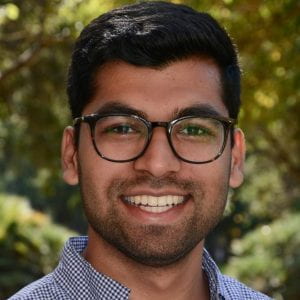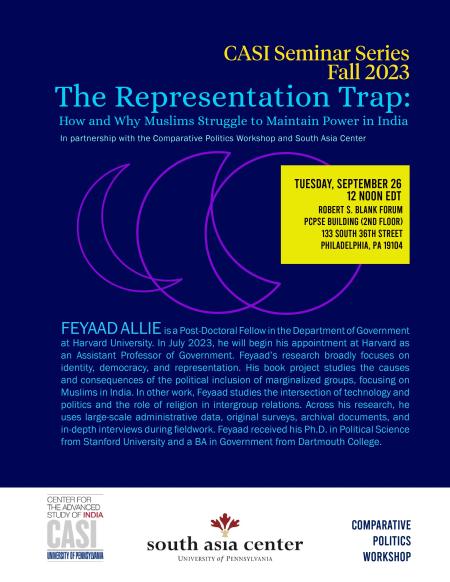The Representation Trap: How and Why Muslims Struggle to Maintain Power in India
Robert S. Blank Forum (2nd floor)
133 South 36th Street
Philadelphia PA 19104
About the Seminar:
Challenging a conventional wisdom that power begets power, Feyaad Allie argues that political gains for marginalized groups can create the very conditions for their political demise. When a marginalized group comes to power without institutional protections, such as quotas or reservations, it can divide the marginalized group and unite the dominant group. Feyaad studies this process, which he calls the representation trap, by focusing on over 200 million Muslims in India who represent one of the world’s largest marginalized groups in the world’s largest democracy. While India has made strides toward the political inclusion of many marginalized groups, Muslims stand in stark contrast, experiencing poor political representation, low socioeconomic status, and communal violence. Using a regression discontinuity design, he finds that a Muslim political win leads to a lower likelihood of a subsequent win by any Muslim candidate. He documents the mechanisms for marginalized group divisions and dominant group consolidation through additional election analyses, experimental evidence from an original, in-person survey of 5,000 Muslim and Hindu voters, and qualitative evidence drawing on 150 elite and voter interviews. Together, the theory and findings challenge the perspective that representation necessarily catalyzes the political empowerment of marginalized groups.
About the Speaker:  Feyaad Allie is a Post-Doctoral Fellow in the Department of Government at Harvard University. In July 2023, he will begin his appointment at Harvard as an Assistant Professor of Government. Feyaad’s research broadly focuses on identity, democracy, and representation. His book project studies the causes and consequences of the political inclusion of marginalized groups, focusing on Muslims in India. In other work, Feyaad studies the intersection of technology and politics and the role of religion in intergroup relations. Across his research, he uses large-scale administrative data, original surveys, archival documents, and in-depth interviews during fieldwork. Feyaad received his Ph.D. in Political Science from Stanford University and a BA in Government from Dartmouth College.
Feyaad Allie is a Post-Doctoral Fellow in the Department of Government at Harvard University. In July 2023, he will begin his appointment at Harvard as an Assistant Professor of Government. Feyaad’s research broadly focuses on identity, democracy, and representation. His book project studies the causes and consequences of the political inclusion of marginalized groups, focusing on Muslims in India. In other work, Feyaad studies the intersection of technology and politics and the role of religion in intergroup relations. Across his research, he uses large-scale administrative data, original surveys, archival documents, and in-depth interviews during fieldwork. Feyaad received his Ph.D. in Political Science from Stanford University and a BA in Government from Dartmouth College.

